Tales of frustration and fear as crews slowly clear snow in San Bernardino Mountains
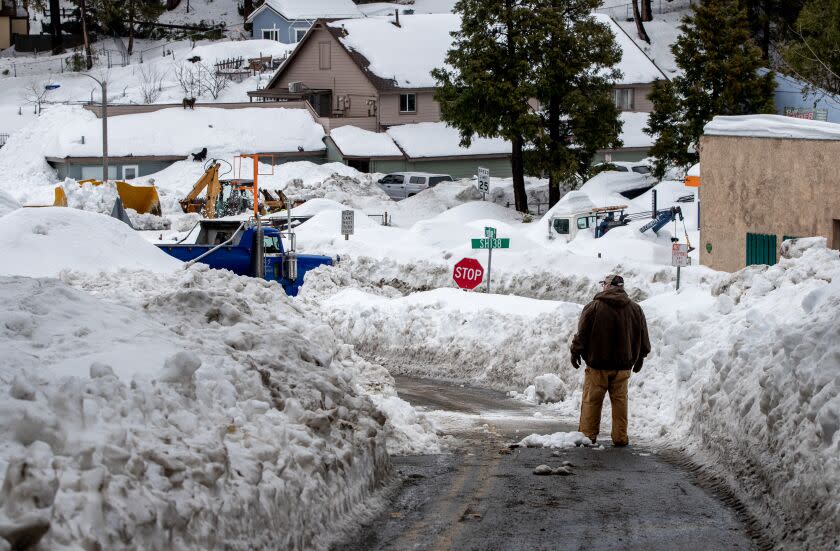
As crews hustled to clear snow-covered roads in the San Bernardino Mountains, many residents remained stranded Monday, frustrated at being cut off for more than 10 days and running low on food and medicine.
The major highways to the mountains were reopened Monday afternoon to residents with proof of residency, the California Highway Patrol announced. They advised residents heading back home to have a contingency plan in case their houses were inaccessible because of the heavy snow.
The San Bernardino Mountains received more than 100 inches of snow over the last several days, stranding an unknown number of people.
State and local agencies were working to clear mounds of snow, using heavy machinery including road graders, front-end loaders, dump trucks, snowplows and snow blowers. Officials from the California Department of Forestry and Fire Protection, the Office of Emergency Management, the CHP and the California National Guard were in the mountain communities helping local agencies dig out residents and clear roads, according to a statement from Gov. Gavin Newsom's office.
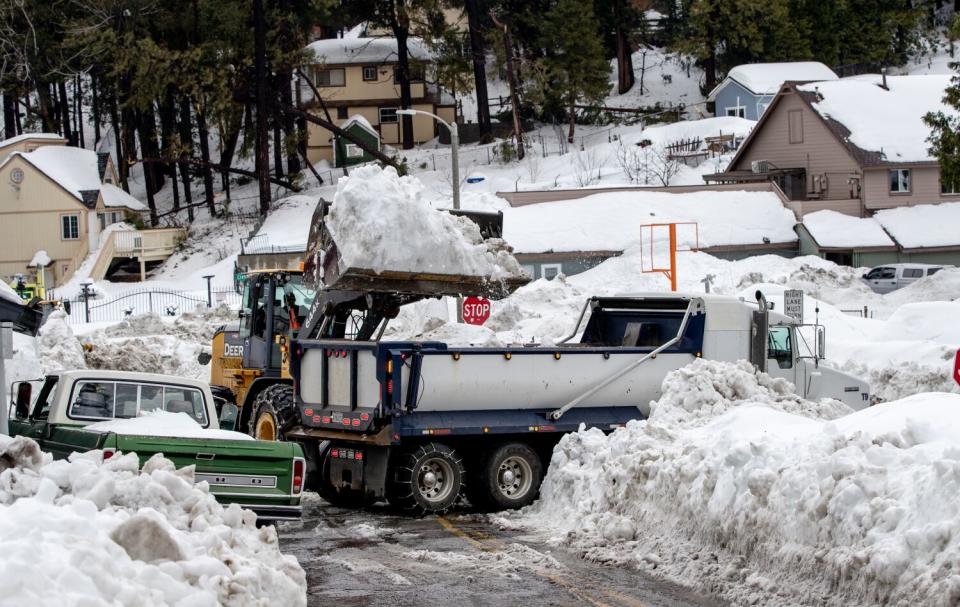
Nearly 60 Caltrans employees had removed more than 7.2 million cubic yards of snow from state highways in San Bernardino County as of Saturday, according to the governor's office. Private contractors removed an additional 970,000 cubic yards from State Routes 18 and 330, the statement added.
Since Sunday, 51 miles of roads have been cleared — defined by the county as one lane cleared with less than 8 inches of snow remaining — out of a total of more than 400 miles that have been serviced. The county estimates that there are nearly 90 miles of road left to be cleared.
The California Department of Transportation is coordinating with local agencies to determine when it will be safe to reopen highways and roads.
The slow pace of clearing roads has been a source of growing anger in mountain communities. Making matters worse, residents have endured gas leaks, fires and roof cave-ins because of the snow, and authorities have struggled to provide aid.
Volunteer crews have tried to help by dropping supplies by helicopter.
Private helicopter pilot Micah Muzio left his home in Lake Arrowhead early Friday morning to deliver supplies to mountain communities, taking off from a San Bernardino airport. Flying over communities, he saw the damage caused by the storms, including collapsed roofs.
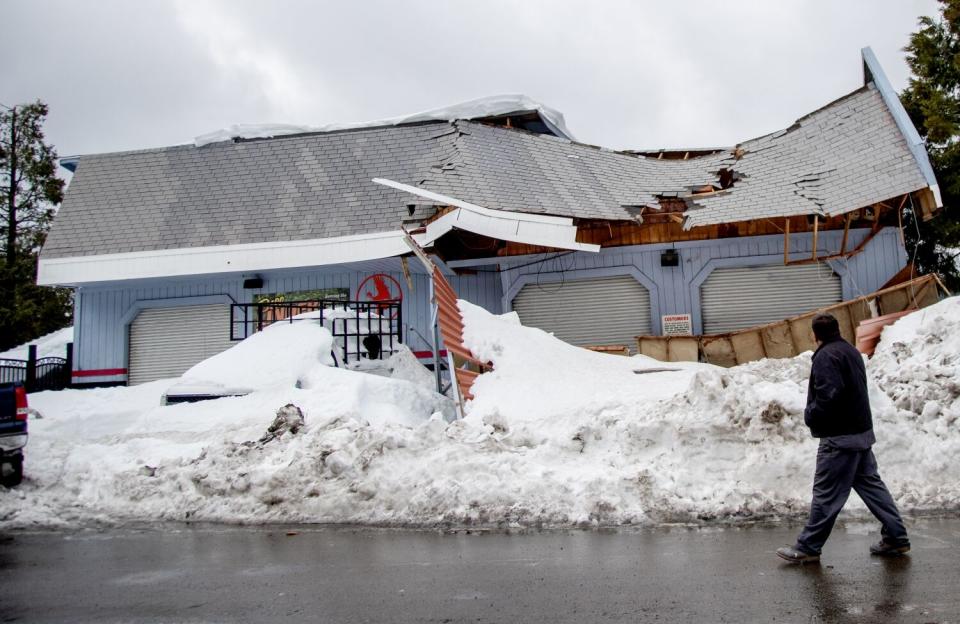
But when he tried to drive home from the airport Saturday, he was stopped at a checkpoint. Roads were closed, and only emergency vehicles and heavy equipment were allowed to pass, he was told. That was not the case when he left home; locals had been allowed to drive up the highway with an emergency-vehicle escort.
He parked his truck at the checkpoint Saturday and hiked about four miles on Highway 18 to an area where a friend could pick him up and drive him home.
“For me, leaving my wife and daughter alone on the mountain in an emergency was intolerable,” Muzio said Monday.
The CHP stopped the vehicle-escort service because the operation hindered efforts to get resources up the mountain, said Officer Ramon Duran.
After being stranded for 11 days in her Lake Arrowhead home, Theresa Grant saw a snowplow roll up the street around 1:30 a.m. Monday and move the remaining 3 to 5 feet of snow blocking the roadway.
Grant had her bags packed, and by 9:30 a.m. she was driving down to Yucaipa to see her mother, who's in hospice care.
“When I was driving down the mountain this morning, I started tearing up when I saw emergency vehicles coming up the front of the mountain, and I looked down the side of the trucks, and they’re from places I didn’t even know about,” she said. “I’m like, ‘Oh, my God, how far are people coming to help us?' "
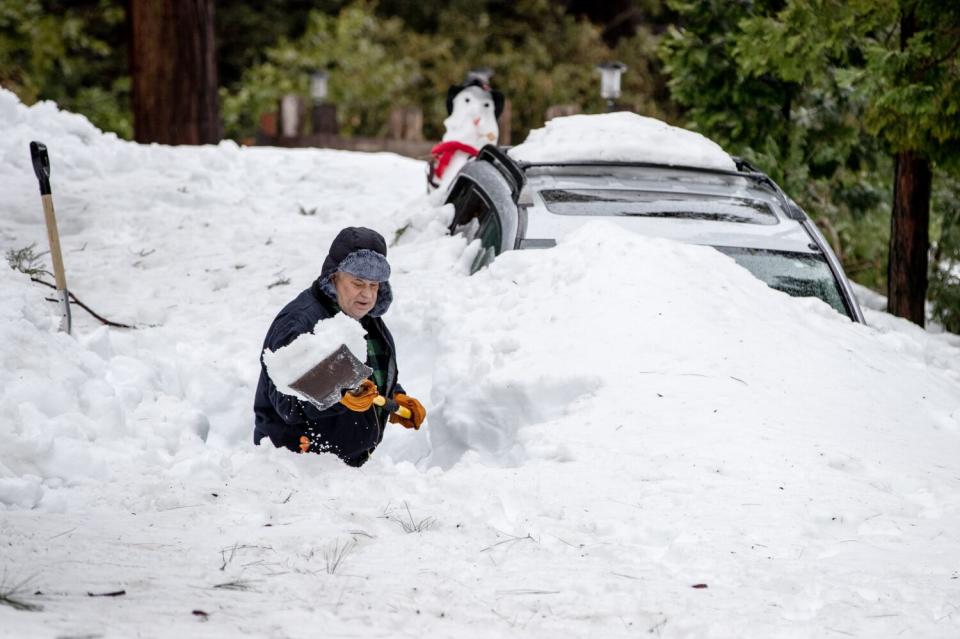
Grant, who has lived in Lake Arrowhead since the 1990s, had never experienced anything like the recent storms.
“We know that this is not normal,” she said. “If we get 2 feet of snow, that’s a huge storm for us at our elevation. To have an event of this magnitude happen, there’s only so much preparation you can do."
Grant said she and her husband were among the "lucky ones" with running water, power and food to last through the week. After the couple ran out of fresh produce, a friend who lives near a road that had been plowed offered to get them groceries. The two hiked through snow 4 feet deep to pick up the produce, as well as eggs and dog food.
Grant knew of elderly and critical-care patients who weren't able to get out of their homes or obtain necessary medications and treatment.
"It’s people like that that I look at, and these were the people who needed to be addressed first," she said. "Those of us who are able-bodied, we could hike out, we could shovel, we could do something. The elderly or those on oxygen without supplies, they cannot shovel themselves out. They literally could not get out, and that just breaks my heart."
Maria Tapia, who owns the cafe Tapia’s Red Cabin in Running Springs, said her daughter and granddaughter were stuck at the bottom of the mountain after driving down to get medication. They were stopped behind the roadblock and didn't know when they would get home, she said.
“She’s been staying in hotels for the last three days. CHP stopped her and told her to go back,” Tapia said. “She needed to go down because her daughter needed insulin.”
Last week, Tapia was worried about locals who were stranded in their homes.
“The snow got so bad that it got to the doors. People were coming out of their windows,” she said. “A lot of people are in need.”
She and her husband make the 30-minute walk to open their cafe every day, because she doesn’t know what else to do for the community.
“I am grateful forever. We make the sacrifice every day to be here,” Tapia said. “But God is good. God is bringing people here.”
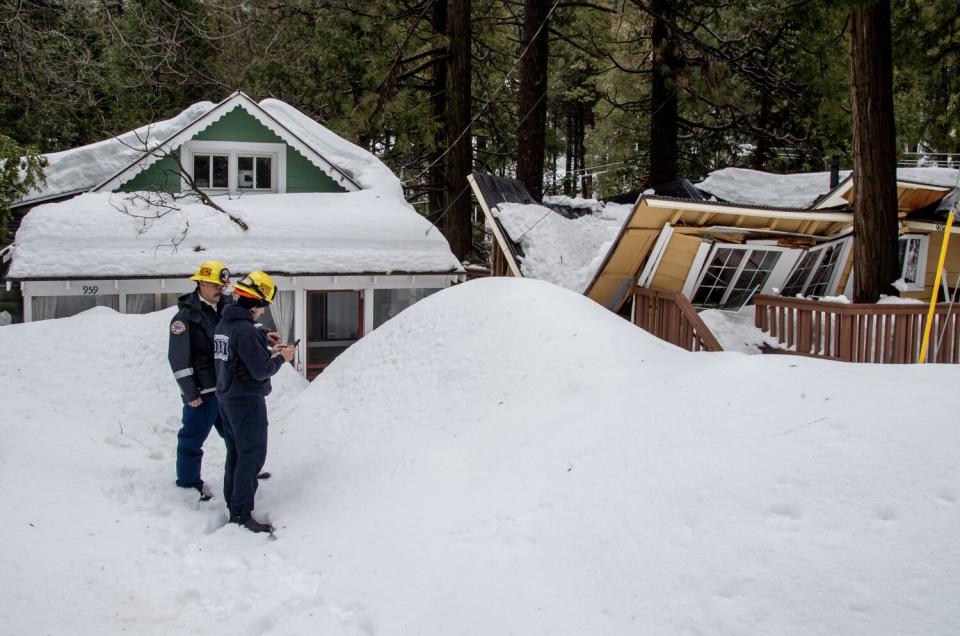
This story originally appeared in Los Angeles Times.

